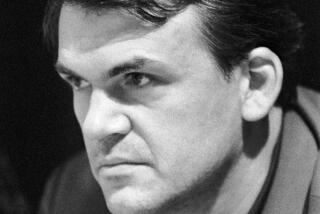What Was Irving Thinking? : ‘Multicultural’ doesn’t begin to describe the rambunctious all-inclusiveness of this fictional universe
- Share via
While other bookish types dither and debate whether anyone who doesn’t belong to a particular minority should be allowed to write about them, that New England pale-face, novelist John Irving, has taken a stand. His barricade and demonstration is “A Son of the Circus,” a cheerfully apocalyptic mystery starring a dislocated native of India.
Irving was packing away bales of research materials from the new novel when I got him on the phone to ask how he dared fly in the face of these sensitive doctrines.
The idea of a racial exclusivity of topics, he said, “is just another name for racism. . . . It’s a myth that because it’s your experience you can’t get it wrong. I find personal experience and memory are not necessarily a fiction writer’s friends. You can make lots of mistakes and have many . . . misperceptions about what has been your own experience. The most outrageous of those being that since it was your experience it must be universal.”
The novel was appropriately launched by the American bicentennial extravaganza around the Statue of Liberty. Struck by the irony of celebrating a nation of immigrants while hundreds of refugee Haitians sat in American concentration camps waiting to be sent back, Irving got to thinking about the difficulties facing racially distinct immigrants.
Then a cab ride through Toronto on a snowy winter night put the novelist at a critical street corner just as a well-dressed Indian pedestrian paused to wait for the light.
“I found myself thinking that there was no fathoming the life . . . that brought him here,” recalls Irving. “That the richness, the foreignness of that life would forever be concealed from those people with whom he now shared a country. . . . Then I realized that without any ill intent I was sort of staring at this guy and that he was aware of it. . . . And he looked at me with some anxiety, reproach, a kind of ‘Why is this man staring at me?’ and in his look I saw his familiarity with racial wariness.”
The light changed, the cab moved on, and Irving went home to begin his new novel at its ending, with the well-dressed brown-skinned man standing on a snowy street corner in Toronto.
The five-year effort to fathom just such a rich and foreign life by dint of research and imagination was aided, as Irving eagerly acknowledges, by a safety net of criticism from Indian friends who sent him back to revising repeatedly. The result: “A Son of the Circus,” is a huge and exuberant juggling act in which comedy and tragedy, the ludicrous and the profound, are playfully and inextricably tangled. Set mainly in India, the novels’ exotic cast includes dwarfs, circus acts, prostitutes, transsexuals, movie stars, beggars and the lushly moneyed elite of Bombay. The plump ring master and mental juggler who connects the multifarious characters and incidents is the aging Circus’ Son himself, Dr. Farrokh Daruwalla. His is the curiously gifted mind that reveals the novel. His non-sectarian decency is its propulsive force. No good deed goes unpunished, and Daruwalla’s random kindness produces random results in the novels’ synchronous three-ring subplots.
The good doctor is Indian born, Austrian educated and a successful orthopedic surgeon in his adopted Canada. The story evolves during one of Dr. Daruwalla’s regular but reluctant visits to his hometown of Bombay. He and his beloved Austrian wife appear comfortable wherever they are, but the doctor’s migrations have stamped him permanently with the eyes of the bemused observer in a strange land. He is an amazed and ambivalent tourist even in Bombay.
With the mystery driving the narrative, Irving takes us on flashback detours from lush comforts of a private country club to the netherworlds of Bombays brothels, the wildly popular Hindi cinema scene, the Crippled Children’s Hospital where Daruwalla works during his visits, and the Indian circuses where he feels oddly at home with dwarf subjects of his genetic researches.
The dedication of “A Son of the Circus” reads, “For Salman,” to honor a long friendship with the Indian author Salman Rushdie, and because, Irving says, “I first went to Bombay, which is his town, when I read (Rushdie’s novel) ‘Midnight’s Children.’ ” The shadow of Rushdie, himself an immigrant before he became a fugitive from the terrorism of Khomeini, touches “The Son of the Circus,” as a final example of Irving’s preferred definition of what a novel should be; “the biggest and most subtle example of the inter-relatedness of all things.”
* TimesLine: 808-8463
To hear John Irving reading from his book “The Son of the Circus,” call TimesLine and press *7819
Call TimesLine from area codes 213, 310, 714, 818 or 909. From other regions, use the area code nearest you.
More to Read
Sign up for our Book Club newsletter
Get the latest news, events and more from the Los Angeles Times Book Club, and help us get L.A. reading and talking.
You may occasionally receive promotional content from the Los Angeles Times.










